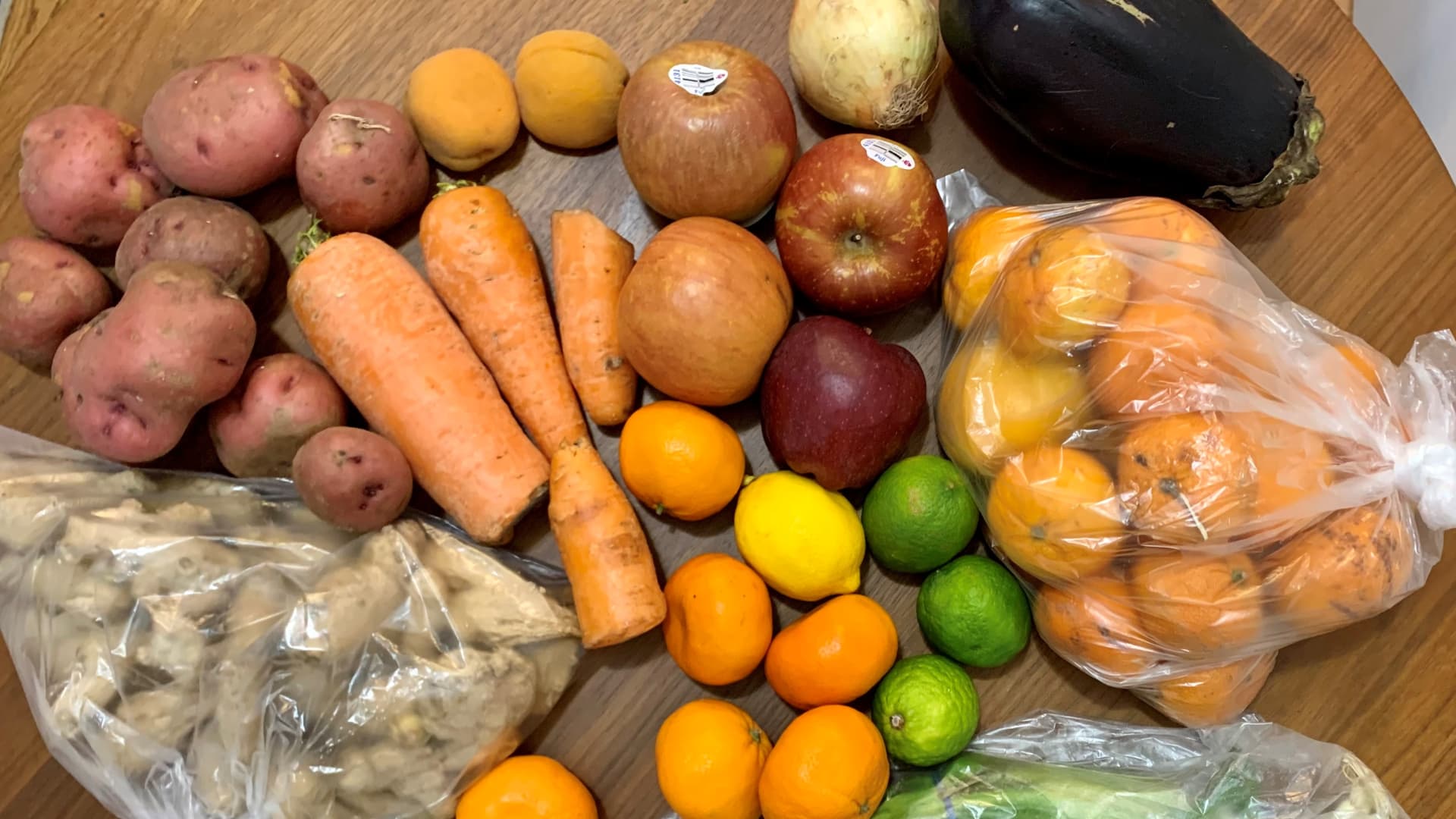
This is an excerpt from CNBC Make It's weekly newsletter. Subscribe here.
Currently, there are a few pounds of fresh produce, including potatoes, clementines, scallions, an eggplant and a bag full of ginger, and a baker's dozen bagels sitting in my fridge and freezer, all procured for under $12. For Manhattan, that's a pretty good deal.
I picked up the two bags of food using Too Good to Go, an app targeting food waste, after reading this SFGate article. Users typically pay $5.99 or $6.99 for a surprise bag of prepared food or produce that would otherwise be tossed at the end of the night at participating restaurants and grocers.
Like Tessa McLean of SFGate, I was shocked by how much food I was given (I even had to leave some produce behind because I couldn't physically carry it all back to my apartment by myself). I immediately cooked some of the potatoes, carrots and the onions, and froze the bagels. I'm still trying to figure out what to do with all of the ginger.
Get New England news, weather forecasts and entertainment stories to your inbox. Sign up for NECN newsletters.

The app has been a pleasant discovery during my self-imposed No Spend month, during which I am trying to spend money only in essential categories like groceries, although I'm looking for ways to trim those costs, too. I got 13 bagels for $5.99 from a restaurant where a single, plain bagel normally costs $1.50, effectively bringing the price down to 46 cents per bagel.
As the SFGate rundown noted, the app works best if you have no food allergies, as you never know what you're going to get, and your schedule is flexible enough to be able to pick up the food within the window given by each restaurant. It is also only available in a handful of locations, and depending on the store, you should plan to use the food quickly, as it could be close to spoiling (or have plenty of freezer space available).
Groceries and dining out have always been the hardest categories for me to budget. Even harder: eating healthily while trying to save money. I try to cook, but I'm not great at it, and I have trouble saying no if a friend wants to catch up over dinner or drinks.

And considering food is the average U.S. household's third-largest monthly expense after housing and transportation, with households spending between $367 and over $1,000 per month on food on average, I'm betting a lot of you can relate.
Money Report
But I'm trying to reduce my costs. In addition to using Too Good to Go, here are a few other tips and tricks that work for me.
Frozen works
For many years, I thought frozen fruits and vegetables were less nutritious than fresh produce. Turns out, that's not true. In fact, "fresh" produce transported to your local grocery store from another state or country is often less nutritious than its frozen counterpart, and likely more expensive.
I now keep a few bags of pre-frozen fruits on hand — usually strawberries, peach slices and blueberries — for when I don't have time to make a grocery run but want a healthy snack. I pick these up when they're on sale: While a carton of fresh strawberries can easily cost $5 to $6 in New York, I can get a frozen bag for $1 to $2.
Make it easy
Nothing turns me off to cooking more than dishes that require 10 steps and 12 different ingredients to produce. It's great if you enjoy that, but allowing myself to forego those complicated recipes in favor of simple meals has been a game changer.
This might seem counterintuitive, but one of the best things I've done for my food budget lately is buy a small rice cooker. This cost me $20, but it's made such a difference in my meals. I now add half a cup to a full cup of rice at a time, and go back to doing whatever I was doing before as it cooks. A bag of rice costs less than $1 per pound at the grocery stores I frequent, and I can use it for weeks of meals.
I then roast or sauté a handful of vegetables and add some soy sauce, and I have a simple, healthy, cost-effective meal. Snack wise, I like to hard boil eggs to have on hand and pre-cut my favorite fruit, like strawberries. I'm not the best at meal planning, but I will roast a bunch of potatoes, carrots and other vegetables for a few days' worth of meals at a time. For my busiest days (or laziest, let's be honest), it's a lifesaver.
Other things that have made cooking easier: a really good chef's knife, plastic containers in different sizes for leftovers or pre-prepared meals and a cast-iron pan. All versatile and encourage me to actually cook.
Engage with others
Sometimes, saving money is as easy as letting someone else come up with a cost-effective recipe for me. There's no shortage of blogs and other cooking communities out there designed to promote cheap, nutritious cooking.
I've found Reddit to be especially useful for finding easy recipes and learning from others. Here are a few of my favorites sites:
Have a few standbys
By far, the best thing I've done over the past few years is create a list of go-to recipes that are simple, healthy and cheap. When I'm short on inspiration, I can turn to one of these instead of ordering takeout.
For office lunches, this often means rice and beans as a base with different vegetables and occasionally meat (I'm not a vegetarian, but I have been trying to reduce my meat intake for cost and environmental reasons).
It's also easy to, well, spice up basic meals by investing in different seasonings and spices. I've found that Asian and African grocery stores have incredible spices, often at lower prices than my local market (they're often fresher, too). If you don't have a specialty store nearby, you can also order them online.
What are your best tips for saving on groceries? Email me at alicia.adamczyk@nbcuni.com.
Sign up now: Get smarter about your money and career with our weekly newsletter
Don't miss: How and why to try a No Spend month






